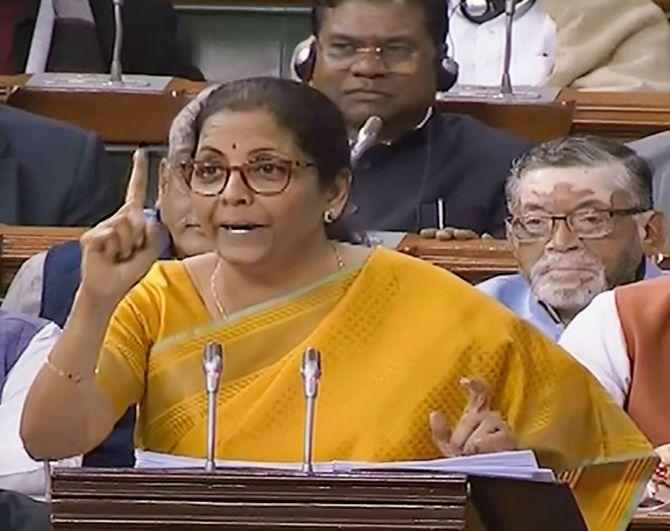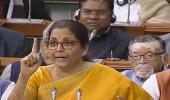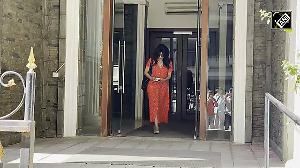'It is a very badly packaged Budget.'
'It gives the impression that it was a half-hearted affair.'

GDP growth is down.
Inflation is high.
Unemployment rate is high.
Business sentiment is the lowest since 2008.
Exports are down.
In such a gloomy scenario, will Finance Minister Nirmala Sithraman's Budget bring cheer?
"The economy needed 3 or 4 major fixes. The major one was, of course, the direct tax structure, but we ended up complicating the existing convoluted tax structure," M R Venkatesh, chartered accountant and lawyer, below, tells Shobha Warrier/Rediff.com in the first of a two-part interview.
You tweeted your initial reaction of the Budget as timid, convoluted, believes in babudom and unrealistic. Why timid and convoluted?
Take the tax structure, for instance. In the name of simplification, there are two different tax structures and different tax rates for the same individual. It has become a sort of laughing matter that you are simplifying by making it more complicated!
And we have 101 pages of the Finance Bill with so many amendments to the Income-Tax Act; so many amendments to various legislatures. Why do we compel ourselves to make so many changes year after year?
Why don't we just say we believe in a very complex tax regime and leave it at that? But we go on declaring that we are need a simple tax regime, but end up making our tryst with taxation a convoluted affair!
And it is a very badly packaged Budget. There seems to be a disconnect with its core constituency, and it gives the impression that it was a half-hearted affair.
When you try to please all, you will end up pleasing none, that's the dictum. Importantly, several declarations made in the previous year's Budget seem to be in embryonic stage even now.
The economy needed 3 or 4 major fixes. The major one was, of course, the direct tax structure, but we ended up complicating the existing convoluted tax structure.
The new income tax slabs give the impression that it will benefit tax payers...
Instead, if you have an income of Rs 15 lakhs, you would be paying more or less the same tax depending on your income and saving structure. All these are complex matrix requiring serious understanding of the I-T law.
So, let us not say that you are simplifying it and reducing the tax burden; just let us say we want more revenue. Let us be honest about what we want to do and then do it.
In the Budget speech, the finance minister not once admitted that the economy was in bad shape. Do you think she should have?
The truth is, whether you admit or not, the economy has several pain points. So, it is a very unenviable task for the finance minister today because there is a global problem which they can't do much about.
There is this coronavirus. You have this structural problem with the economy. Then, there is a cyclical problem.
You also have this problem of implementation with GST. Then administration is in crying need of reforms, so is the judiciary.
So, a confluence of several factors are affecting the economy. I wouldn't use the word recession, but there is a slowdown in the growth of the economy.

Would you say massive slowdown?
Yes, massive slowdown. What you can achieve is 8% growth, but you are doing at less than 5%.
GDP is down. The Unemployment rate is high. Inflation is high. Are there any reforms in this Budget to attack these three major problems?
See, the Budget talks about, for example, how to distribute seeds to the farmers. I am not saying that is not important. But that is not going to solve your unemployment problem or improve GDP.
There is a paucity of a big picture to attack the slowdown in the economy.
So many people who supported demonetisation when it was implemented now say it was demonetisation that destroyed the MSME sector and the rural economy. It created such a deep wound that even after three years, the wound has not healed. Do you agree?
No, I don't agree with that. I have a contrarian view. The problem for the economy is that the profitability of the corporate sector is dwindling. That is magnifying the gloom and doom.
But when there is no demand for goods, how will they contribute?
That alone should not be the reason for them not contributing.
They have also made many governance mistakes. That's why I said there was a structural problem.
There are no greenfield projects coming up. Last year, there were only IPOs worth Rs 12,000 crores (120 billion) which shows there is something terribly wrong in the economy.
It shows entrepreneurs don't have the courage to invest, and investment happens only when there is confidence.
Whether this Budget will bring back the confidence is a million dollar question!
It is said there is a trust deficit...
Yes, the Economic Survey also implicitly says that.
Is it because public spending is not there, demand is not there?
No...no... See, whenever you are going to do business with the government, you are going to land in a problem. That is the truth of the matter.
But the finance minister announced so many projects on the PPP model...
The PPP model has been a disaster. She may not know that there are about Rs 8 lakh to Rs 10 lakh crores of blocked PPP that are in various stages.
Any contract with the government invariably ends up in litigation. So, whenever there is a bad administrative decision by the government, you have to necessarily go to court. That takes time and money, and affects your confidence in doing business.
So, it is the government that has to first address administrative reform which they are not ready to do.
You have been taking about the need to end babudom. In the present system, babudom is the channel through which you can implement any project.
The problem today is our babudom lacks bandwidth. One or two babus may be excellent, but the managerial bandwidth required to manage the three trillion economy is simply not there.
How many of them will be able to handle, for example, the taxation of the digital economy? You require 500 to 600 competent IRS officers to do the job, but that itself is not available today.
- Part 2 of the interview: '2 to 3 years for economy to recover'










